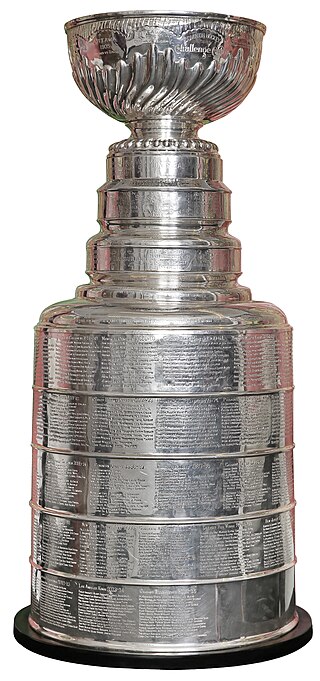
The Stanley Cup is the championship trophy awarded annually to the National Hockey League (NHL) playoff champion. It is the oldest existing trophy to be awarded to a professional sports franchise in North America, and the International Ice Hockey Federation (IIHF) considers it to be one of the "most important championships available to the sport". The trophy was commissioned in 1892 as the Dominion Hockey Challenge Cup and is named after Lord Stanley of Preston, the Governor General of Canada, who donated it as an award to Canada's top-ranking amateur ice hockey club. The entire Stanley family supported the sport, the sons and daughters all playing and promoting the game. The first Cup was awarded in 1893 to the Montreal Hockey Club, and winners from 1893 to 1914 were determined by challenge games and league play. Professional teams first became eligible to challenge for the Stanley Cup in 1906. In 1915, the National Hockey Association (NHA) and the Pacific Coast Hockey Association (PCHA), the two main professional ice hockey organizations, reached an agreement in which their respective champions would face each other annually for the Stanley Cup. It was established as the de facto championship trophy of the NHL in 1926 and then the de jure NHL championship prize in 1947.
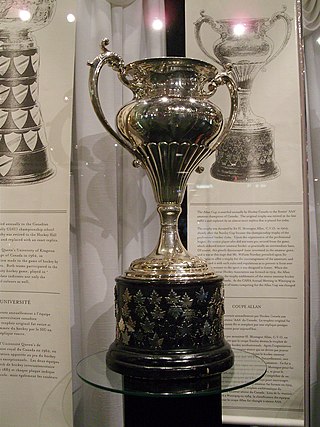
The Allan Cup is the trophy awarded annually to the senior ice hockey champions of Canada. It was donated by Sir Montagu Allan of Ravenscrag, Montreal, and has been competed for since 1909. The current champions are the Dundas Real McCoys, who captured the 2023 Allan Cup in Dundas, Ontario.

Dale Martin Hawerchuk was a Canadian professional ice hockey player and coach. Drafted first overall by the Winnipeg Jets in the 1981 NHL Entry Draft, Hawerchuk played in the National Hockey League (NHL) for 16 seasons as a member of the Jets, Buffalo Sabres, St. Louis Blues, and Philadelphia Flyers. He won the NHL's Calder Memorial Trophy as rookie of the year in 1982 and was elected to the Hockey Hall of Fame in his second year of eligibility in 2001. Hawerchuk served as the head coach of the Barrie Colts of the Ontario Hockey League from 2010 to 2019.

Fanny "Bobbie" Rosenfeld was a Canadian athlete, who won a gold medal for the 100-metre relay and a silver medal for the 100-metre at the 1928 Summer Olympics in Amsterdam. She was a star at basketball, hockey, softball, and tennis; and was called Bobbie for her "bobbed" haircut. In 1949, named Rosenfeld the "Canadian woman athlete of the half-century." The Bobbie Rosenfeld Award is named in her honour. In 1996, she was inducted into the Ontario Sports Hall of Fame.
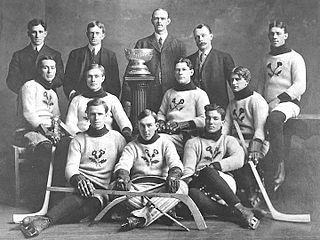
The Kenora Thistles, officially the Thistles Hockey Club, were a Canadian ice hockey team based in Kenora, Ontario. Founded in 1894, they were originally known as the Rat Portage Thistles. The team competed for the Stanley Cup, the ice hockey championship of Canada, five times between 1903 and 1907. The Thistles won the Cup in January 1907 and defended it once before losing it that March in a challenge series. Composed almost entirely of local players, the team comes from the least populated city to have won the Stanley Cup. Nine players—four of them homegrown—have been inducted into the Hockey Hall of Fame, and the Stanley Cup champion team was inducted into the Northwestern Ontario Sports Hall of Fame.

The Winnipeg Victorias were a former amateur senior-level men's amateur ice hockey team in Winnipeg, Manitoba, organized in 1889. They played in the Manitoba Hockey Association (MHA) in the late 19th and early 20th centuries. The Victorias won the Stanley Cup in February 1896, 1901 and January 1902 while losing the Cup in December 1896, February 1899, February 1900, March 1902, and February 1903. After the Stanley Cup became the professional championship, the Victorias continued in senior-level amateur play, winning the Allan Cup in 1911 and 1912.

Ernest Harvey Pulford was a Canadian athlete at the turn of the twentieth century, winning national championships in ice hockey, lacrosse, football, boxing, paddling and rowing. A highly regarded defenceman with the Ottawa Hockey Club, where he was known for being a large and solid player who was excellent at checking opponents. With Ottawa he won the Stanley Cup four times, and also won championships or tournaments in every sport in which he played. When the Hockey Hall of Fame was founded in 1945, Pulford was one of the original nine inductees.

The Edmonton Grads were a Canadian women's basketball team based in Edmonton, Alberta, Canada active from 1912 – 1940. The team continues to hold the North American record for the women's sports team with the best winning percentage. The Grads won the first women's world title in basketball in 1924.
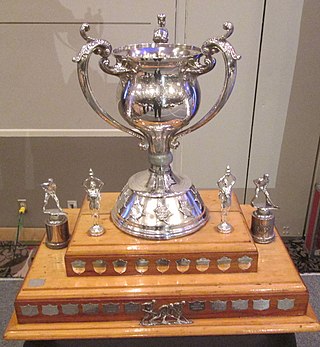
The Abbott Memorial Cup, commonly referred to as the Abbott Cup, was awarded annually from 1919 through 1999 to the Junior "A" ice hockey Champion for Western Canada.

The George Richardson Memorial Trophy was presented annually from 1932 until 1971, by the Canadian Amateur Hockey Association. It represented the Eastern Canada junior hockey championship, and a berth in the Memorial Cup final versus the Abbott Cup champion from Western Canada. The George Richardson Memorial Trophy was retired in 1971, when the Memorial Cup became a round-robin series between the winners of the three major junior hockey leagues in Canada; the Western Hockey League, the Ontario Hockey League and Quebec Major Junior Hockey League. The trophy was named for Captain George Taylor Richardson, a hockey player who died while serving in World War I.

Claude Copeland Robinson was a Canadian ice hockey and sports executive. After winning an intermediate-level championship as captain of the Winnipeg Victorias in 1905, he served as secretary-treasurer and as vice-president of the Victorias. He coached the Victorias to a Manitoba Hockey League championship in 1909, and felt that his team could have competed for the newly established Allan Cup, despite that challenges from senior ice hockey teams were accepted only from Eastern Canada at the time. The Victorias won the Allan Cup by default in 1911, when the Toronto St. Michael's Majors refused to play, then successfully defended four challenges for the trophy.

Sylvester Patrick "Silver" Quilty was a Canadian football player, referee, coach and sport administrator. As a player, he won the Yates Cup in 1907 with the Ottawa Gee-Gees football team, and was credited as the first man to play the flying wing position. He also played with the Ottawa Rough Riders, and the McGill Redmen football team. After his playing career, he became a football referee and officiated the 10th Grey Cup, and also coached the Ottawa Rough Riders.

The first instances of organized women's ice hockey in Canada date back to the 1890s when it was played at the university level. The Women's Hockey Association claims that the city of Ottawa, Ontario hosted the first game in 1891. In 1920, Lady Meredith, an avid sportswoman and wife of Sir Vincent Meredith of Montreal donated the Lady Meredith Cup to the Quebec Ladies' Hockey Association, said to be the first women's ice hockey trophy created for a competition in Canada. At the time women competed in ankle-length skirts.
The Ladies Ontario Hockey Association (LOHA) was a women's ice hockey association in Ontario, Canada. It was founded in 1922, but faded during the Great Depression, as ice time for women's teams became rare and the number of member teams significantly decreased.
The Edmonton Rustlers were a women's ice hockey team that competed during the Great Depression.
The history of Canadian sports falls into five stages of development: early recreational activities before 1840; the start of organized competition, 1840–1880; the emergence of national organizations, 1882–1914; the rapid growth of both amateur and professional sports, 1914 to 1960; and developments of the last half-century. Some sports, especially ice hockey, lacrosse, curling, and ringette enjoy an international reputation as particularly Canadian. Although typically thought of as American, the origin of the sport of baseball began the Canadian town of Beachville, Ontario, and American football was initially developed by Canadians at McGill University before two different playing styles emerged, American football and Canadian football. Canadian sports attract large numbers of participants and huge audiences; hockey, played by 1.4 million Canadians, has become part of the national identity.

Ice hockey, simply referred to as "hockey" in both English and French in Canada, dates back to the 19th century. The sport is very popular and played year-round and at every level in the country. Born of various influences from stick-and-ball games brought from the United Kingdom and indigenous games, the contemporary sport of ice hockey originated in Montreal. It is the official national winter sport of Canada. Hockey is widely considered Canada's national pastime, with high levels of participation by children, men, and women at various levels of competition.

Hilda Doris Ranscombe was a Canadian ice hockey player. She served for ten seasons as the Preston Rivulettes captain, and led the team to ten consecutive Ladies Ontario Hockey Association championships, five Eastern Canadian titles, and four national championships. She was considered one of the best female hockey players of her time, possessing natural speed and talent, that compared to players in the National Hockey League. Ranscombe was twice a finalist for the Lou Marsh Trophy, and twice inducted into Canada's Sports Hall of Fame–as an individual athlete in 2015, and as a member of the Rivulettes in 2022.
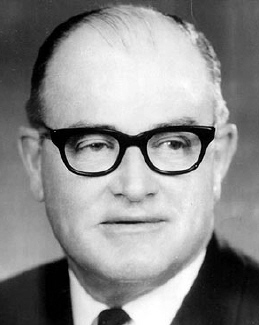
Frank Forest Sargent was a Canadian sports executive in ice hockey and curling. He served as president of the Canadian Amateur Hockey Association (CAHA) from 1942 to 1945, and was president of the Dominion Curling Association (DCA) from 1965 to 1966. He was the first person to be elected to more than two terms as CAHA president, and the first to be president of two national amateur sporting associations in Canada.

Mary Dunn was a Canadian sports executive. She played on the Manitoba Bisons women's ice hockey team while in university, then became an executive with the Winnipeg Women's Senior Hockey League and the Manitoba Ladies' Hockey Association. She later served as vice-president, and then president of the Dominion Women's Amateur Hockey Association, where she arranged playoffs for the Canadian women's hockey championship. She was married to fellow sports executive Jimmy Dunn, and co-ordinated amateur sports for ladies as the vice-president then president of the Manitoba branch of the Women's Amateur Athletic Federation of Canada. She later served as president of the Winnipeg Community Chest, the Central Volunteer Bureau of Manitoba, and the Oriole Community Club in Winnipeg.


















